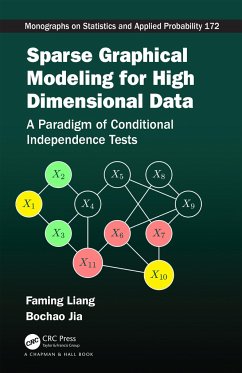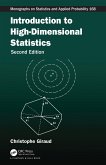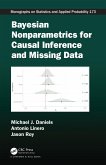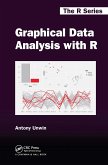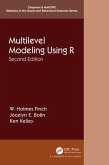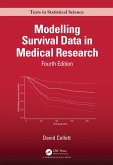Faming Liang, Bochao Jia (Eli Lilly and Company, Corporate Center, Indianapolis I
Sparse Graphical Modeling for High Dimensional Data
A Paradigm of Conditional Independence Tests
Faming Liang, Bochao Jia (Eli Lilly and Company, Corporate Center, Indianapolis I
Sparse Graphical Modeling for High Dimensional Data
A Paradigm of Conditional Independence Tests
- Gebundenes Buch
- Merkliste
- Auf die Merkliste
- Bewerten Bewerten
- Teilen
- Produkt teilen
- Produkterinnerung
- Produkterinnerung
This book provides a general framework for learning sparse graphical models with conditional independence tests. It includes complete treatments for Gaussian, Poisson, multinomial, and mixed data; unified treatments for covariate adjustments, data integration, and network comparison.
Andere Kunden interessierten sich auch für
![Introduction to High-Dimensional Statistics Introduction to High-Dimensional Statistics]() Christophe Giraud (France Paris Sud University)Introduction to High-Dimensional Statistics105,99 €
Christophe Giraud (France Paris Sud University)Introduction to High-Dimensional Statistics105,99 €![Bayesian Nonparametrics for Causal Inference and Missing Data Bayesian Nonparametrics for Causal Inference and Missing Data]() Michael J. DanielsBayesian Nonparametrics for Causal Inference and Missing Data111,99 €
Michael J. DanielsBayesian Nonparametrics for Causal Inference and Missing Data111,99 €![Post-Shrinkage Strategies in Statistical and Machine Learning for High Dimensional Data Post-Shrinkage Strategies in Statistical and Machine Learning for High Dimensional Data]() Syed Ejaz Ahmed (Prof. of Maths and Brock Uni. Statistics)Post-Shrinkage Strategies in Statistical and Machine Learning for High Dimensional Data168,99 €
Syed Ejaz Ahmed (Prof. of Maths and Brock Uni. Statistics)Post-Shrinkage Strategies in Statistical and Machine Learning for High Dimensional Data168,99 €![Graphical Data Analysis with R Graphical Data Analysis with R]() Antony Unwin (University of Augsburg)Graphical Data Analysis with R54,99 €
Antony Unwin (University of Augsburg)Graphical Data Analysis with R54,99 €![The Data Preparation Journey The Data Preparation Journey]() Martin Hugh Monkman (Division of Continuing University of VictoriaThe Data Preparation Journey67,99 €
Martin Hugh Monkman (Division of Continuing University of VictoriaThe Data Preparation Journey67,99 €![Multilevel Modeling Using R Multilevel Modeling Using R]() W. Holmes Finch (USA Ball State University)Multilevel Modeling Using R72,99 €
W. Holmes Finch (USA Ball State University)Multilevel Modeling Using R72,99 €![Modelling Survival Data in Medical Research Modelling Survival Data in Medical Research]() David Collett (UK Transplant, Bristol, UK)Modelling Survival Data in Medical Research94,99 €
David Collett (UK Transplant, Bristol, UK)Modelling Survival Data in Medical Research94,99 €-
-
-
This book provides a general framework for learning sparse graphical models with conditional independence tests. It includes complete treatments for Gaussian, Poisson, multinomial, and mixed data; unified treatments for covariate adjustments, data integration, and network comparison.
Produktdetails
- Produktdetails
- Chapman & Hall/CRC Monographs on Statistics and Applied Probability
- Verlag: Taylor & Francis Ltd
- Seitenzahl: 130
- Erscheinungstermin: 2. August 2023
- Englisch
- Abmessung: 162mm x 242mm x 14mm
- Gewicht: 348g
- ISBN-13: 9780367183738
- ISBN-10: 0367183730
- Artikelnr.: 67825294
- Chapman & Hall/CRC Monographs on Statistics and Applied Probability
- Verlag: Taylor & Francis Ltd
- Seitenzahl: 130
- Erscheinungstermin: 2. August 2023
- Englisch
- Abmessung: 162mm x 242mm x 14mm
- Gewicht: 348g
- ISBN-13: 9780367183738
- ISBN-10: 0367183730
- Artikelnr.: 67825294
Dr. Faming Liang is Distinguished Professor of Statistics, Purdue University. Prior joining Purdue University in 2017, he held regular faculty positions in the Department of Biostatistics, University of Florida and Department of Statistics, Texas A&M University. Dr. Liang obtained his PhD degree from the Chinese University of Hong Kong in 1997. Dr. Liang is ASA fellow, IMS fellow, and elected member of International Statistical Association. Dr. Liang is also a winner of Youden Prize 2017. Dr. Liang has served as co-editor for Journal of Computational and Graphical Statistics, associate editor for multiple statistical journals, including Journal of the American Statistical Association, Journal of Computational and Graphical Statistics, Technometrics, Bayesian Analysis, and Biometrics, and editorial board member for Nature Scientific Report. Dr. Liang has published two books and over 130 journal/conference papers, which involve a variety of research fields such as Markov chain Monte Carlo, machine learning, bioinformatics, high-dimensional statistics, and big data computing. Dr. Bochao Jia is research scientist at Eli Lilly and Company, Lilly Corporate Center, Indianapolis, Indiana, U.S.A. Dr. Jia obtained his PhD degree from University of Florida in 2018. Dr. Jia has published quite a few papers on sparse graphical modelling.
1. Introduction to Sparse Graphical Models 2. Gaussian Graphical Models 3.
Gaussian Graphical Modeling with Missing Data 4. Gaussian Graphical
Modeling for Heterogeneous Data 5. Poisson Graphical Models 6. Mixed
Graphical Models 7. Joint Estimation of Multiple Graphical Models 8.
Nonlinear and Non-Gaussian Graphical Models 9. High-Dimensional Inference
with the Aid of Sparse Graphical Modeling 10. Appendix
Gaussian Graphical Modeling with Missing Data 4. Gaussian Graphical
Modeling for Heterogeneous Data 5. Poisson Graphical Models 6. Mixed
Graphical Models 7. Joint Estimation of Multiple Graphical Models 8.
Nonlinear and Non-Gaussian Graphical Models 9. High-Dimensional Inference
with the Aid of Sparse Graphical Modeling 10. Appendix
1. Introduction to Sparse Graphical Models 2. Gaussian Graphical Models 3.
Gaussian Graphical Modeling with Missing Data 4. Gaussian Graphical
Modeling for Heterogeneous Data 5. Poisson Graphical Models 6. Mixed
Graphical Models 7. Joint Estimation of Multiple Graphical Models 8.
Nonlinear and Non-Gaussian Graphical Models 9. High-Dimensional Inference
with the Aid of Sparse Graphical Modeling 10. Appendix
Gaussian Graphical Modeling with Missing Data 4. Gaussian Graphical
Modeling for Heterogeneous Data 5. Poisson Graphical Models 6. Mixed
Graphical Models 7. Joint Estimation of Multiple Graphical Models 8.
Nonlinear and Non-Gaussian Graphical Models 9. High-Dimensional Inference
with the Aid of Sparse Graphical Modeling 10. Appendix

